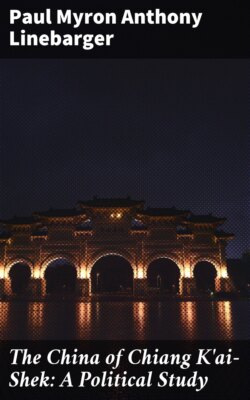Читать книгу The China of Chiang K'ai-Shek: A Political Study - Paul Myron Anthony Linebarger - Страница 11
На сайте Литреса книга снята с продажи.
The Yüeh Fa of 1931
ОглавлениеTable of Contents
In 1931, after three years' operation under an Organic Law, the National Government adopted the Yüeh Fa (Provisional Constitution),[2] designed to cover the period between the first stage of the revolution, military conquest, and the final one of constitutional government. This intermediate period was formally labelled the stage of political tutelage, although in fact the military unification of the country continued. The Provisional Constitution, designed for five years' use, has continued in force to the present (March 1941). It possesses the merit of attempting to make actual practice and constitutional form correspond. Grandiloquent, unenforceable provisions concerning elections are omitted, and full exercise of the powers of sovereignty are frankly entrusted to the tutelary Party, the Kuomintang. Such a constitution, formally making the Kuomintang different from and higher than any other party in China—and, for all that, in the world, since the Fascist, National Socialist, and Communist parties are not formally the constitutional superiors of their respective governments—and giving the Party unrestricted authority, has provided China with government realistic if not libertarian.
The constitutional basis of the present Party-dictatorship in China is well summarized by the distinguished constitutional commentator, Dr. Wang Shih-chieh:
According to Sun Chung-shan's[3] Chien-kuo Ta-kang [Outlines of National Reconstruction], China should pass through a period of political tutelage under the Chinese Kuomintang,[4] before the stage of constitutional government be reached. The National Government is merely an organization through which a true republic may be formed. Hence, in order to demonstrate the structure of the National Government clearly, we must first understand the meaning of tang chih [party government].
"Party government," so-called, signifies that the whole system of government is under the control or dictatorship of one political party only. The only difference between party government and dictatorship is that the former is under the dictatorship of an entire political party, while the latter is under that of a single person. Party government is of course different from democracy, inasmuch as with democracy, all policies are to be decided by the entire body of citizens, while with party government, policies are to be decided by all the members of the particular party only. In other words, the entire party as one man can exercise political dictatorship, without taking into consideration the opinions of those who are not the members of the party. Any resolution passed by that party is considered a law not only in fact, but sometimes even in name; moreover, the party may cancel or change a law by a resolution passed in a meeting.
The above-mentioned points are phenomena common to countries under party governments.
After the Chinese Kuomintang has come into power, the system of party government is not only a fact, but even prescribed in laws. The Laws Governing the System of Organization of the National Government of the Republic of China promulgated for the first time on July 1, Year XIV (1925) were originally formulated by the Political Council of the Chinese Kuomintang. Article I in this code of laws provided: "The National Government discharges all the political affairs of the entire country, under the direction and superintendency of the Chinese Kuomintang." The said code has been constantly amended since its first promulgation, but this article has always remained unchanged. By the summer of Year XVII (1928), when the successful Northern Expedition undertaken by the National Revolutionary Army unified China under one government, the period of political tutelage of the Chinese Kuomintang began with the formulation and promulgation of the Outlines of Political Tutelage on October 3, Year XVII (1928). Article I of the said "Outlines" provided: "During the period of political tutelage of the Republic of China, the National Party Congress of the Chinese Kuomintang will take the place of the National Convention to lead the people and enforce all policies." By the beginning of June, in Year XX (1931), when the Provisional Constitution for the period of political tutelage was promulgated, the Outlines of Political Tutelage were again formed into a part of the Provisional Constitution, thereby giving party government a constitutional recognition. Besides the Outlines of Political Tutelage, Article 72 ("The National Government [Council of State] has a President and a certain number of state councillors, appointed by the Central Executive Committee of the Chinese Kuomintang."), and Article 58 ("The Central Executive Committee of the Chinese Kuomintang is vested with the power of interpreting this Provisional Constitution.") of the Provisional Constitution, and Article 10 ("The National Government has a President, twenty-four to thirty-six state councillors, a President and a Vice-President of every Yüan, appointed by the Central Executive Committee of the Chinese Kuomintang."), and Article 15 ("Before the promulgation of the Constitution, the Executive, Legislative, Judicial, Examination and Control Yüan will each be responsible to the Central Executive Committee of the Chinese Kuomintang.") of the Laws Governing the System of Organization of the National Government (December 30, Year XX [1931]) now being enforced, form the legal basis for party government.[5]
Under Kuomintang trusteeship, demands have been heard within and without the Party, for the promised abdication of the Party and for the initiation of popular government. Since the Kuomintang, unlike European one-party groups, established itself only for the formal purpose of democratic training, and was pledged to tolerate multi-party government as soon as possible, the continued monopoly of power was a frustration of the Party ideology and programs. The frustration was serious; involving much loss of popular sympathy for the government, this and appeasement rather demoralized the Party in the years preceding the invasion.
